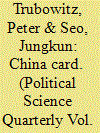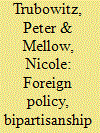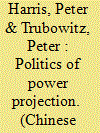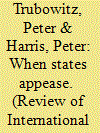| Srl | Item |
| 1 |
ID:
117827


|
|
|
| 2 |
ID:
105355


|
|
|
|
|
| Publication |
2011.
|
| Summary/Abstract |
The attacks of September 11 and the resulting war on terrorism present a puzzle to conventional explanations of foreign policy bipartisanship. Public anxiety about the international environment increased sharply after the attacks in 2001, but this did not translate into greater foreign policy consensus despite the initial predictions of many analysts. In this article, we advance a theory of foreign policy bipartisanship that emphasizes its domestic underpinnings to explain the absence of consensus in Washington. We argue that bipartisanship over foreign policy depends as much on domestic economic and electoral conditions as on the international security environment. Using multivariate analysis of roll call voting in the House of Representatives from 1889 to 2008, we show that bipartisanship over foreign policy is most likely not only when the country faces a foreign threat but also when the national economy is strong and when party coalitions are regionally diverse. This was the case during the Cold War. Despite concern about terrorism in recent years, economic volatility and regional polarization have made bipartisan cooperation over foreign policy elusive.
|
|
|
|
|
|
|
|
|
|
|
|
|
|
|
|
| 3 |
ID:
177313


|
|
|
|
|
| Summary/Abstract |
Why did the Obama administration's attempted pivot (or “rebalance”) to Asia fail? In this article, we argue that three interrelated domestic factors are to blame: hyper-partisanship in Washington, DC; the lack of a compelling foreign-policy narrative to make the pivot intelligible and attractive to a broad slice of the political class and domestic public; and the related failure to convince enough Americans that the pivot was necessary to boost their economic fortunes. These domestic stumbling blocks made it impossible for the Obama administration to invest US power assets toward a long-term programmatic endeavor in the Asia-Pacific. In making this argument about the domestic foundations of US power-projection, we improve upon existing explanations of the pivot's undoing that focus on international-level obstacles, problems with the pivot's design and implementation, or the unexpected election of Donald Trump as Obama's successor. We conclude by drawing implications for US power projection beyond the pivot and, indeed, beyond East Asia—suggesting that the US political system has become a weak foundation upon which to build any ambitious foreign-policy superstructure.
|
|
|
|
|
|
|
|
|
|
|
|
|
|
|
|
| 4 |
ID:
184256


|
|
|
|
|
| Summary/Abstract |
The West is turning inward. Donald Trump’s presidency, Britain’s decision to leave the European Union, and the spread of populist parties in Europe are the most visible signs of this retreat. The shift is not as recent as these examples suggest, however. Drawing on an array of cross-national data for twenty-four industrialized democracies and hundreds of political parties in those democracies, we show that domestic support for liberal internationalism has been receding for twenty-five years across the West. We show that since the end of the Cold War a large and widening gap has opened up between Western democracies’ international ambitions and their domestic political capacity to support them. As Western governments came to rely increasingly on economic globalization, institutionalized cooperation, and multilateral governance, mainstream parties that backed these efforts lost electoral ground to parties on the radical-left and increasingly, the anti-globalist radical-right that have been the vehicles of the current backlash. We discuss the implications of these trends for the Western liberal international order and the strategies now on offer to repair it.
|
|
|
|
|
|
|
|
|
|
|
|
|
|
|
|
| 5 |
ID:
139579


|
|
|
|
|
| Summary/Abstract |
When do states appease their foes? In this article, we argue that governments are most likely to favour appeasing a foreign threat when their top leaders are severely cross–pressured: when the demands for increased security conflict sharply with their domestic political priorities. We develop the deductive argument through a detailed analysis of British appeasement in the 1930s. We show that Neville Chamberlain grappled with a classic dilemma of statecraft: how to reduce the risk of German expansionism while facing acute partisan and electoral incentives to invest resources at home. For Chamberlain, appeasement was a means to reconcile the demands for increased security with what he and his co-partisans were trying to achieve domestically. We conclude by discussing implications of the analysis for theorising about appeasement and about how leaders make grand strategy more generally.
|
|
|
|
|
|
|
|
|
|
|
|
|
|
|
|